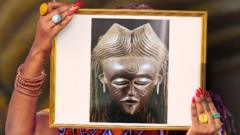
Reclaiming Narratives: How Social Media is Challenging Misconceptions About African Knowledge Systems
Introduction: A Digital Renaissance of African Intellectual History
For centuries, the narrative surrounding African societies has been plagued by a persistent and damaging misconception: the assertion that Africa lacked indigenous knowledge systems prior to colonial influence. This view, deeply rooted in historical biases and a Eurocentric worldview, has served to marginalize and devalue the rich intellectual heritage of the continent. However, a powerful counter-narrative is emerging, fueled by the accessibility and reach of social media. Through online platforms, Africans and members of the diaspora are actively reclaiming their history, showcasing the sophistication and complexity of pre-colonial African knowledge.
The Persistence of the Misconception: A Legacy of Colonialism
The notion of Africa as a "blank slate," devoid of its own established systems of knowledge, is a direct consequence of colonial ideology. European powers, seeking to justify their exploitation and dominance, actively suppressed and discredited indigenous African practices, replacing them with Western models of education, governance, and technology. This historical context has resulted in the erasure of African intellectual contributions from mainstream historical accounts and educational curricula. The result is that even today, many individuals remain unaware of the advanced scientific, philosophical, and artistic achievements of pre-colonial African societies.
Social Media as a Platform for Counter-Narratives
Social media provides a unique space for challenging these deeply ingrained misconceptions. Platforms like Twitter, Instagram, Facebook, and YouTube allow individuals to share information, stories, and perspectives that are often excluded from traditional media outlets. This democratization of information has empowered Africans to become active participants in shaping their own narrative.
Examples of Knowledge Systems Being Highlighted:
- Mathematics and Astronomy: Accounts highlight the advanced mathematical systems developed in ancient Egypt and the sophisticated astronomical knowledge of cultures like the Dogon people of Mali, who possessed detailed understanding of celestial bodies.
- Medicine and Healing: Users are sharing information about traditional African medicinal practices, including the use of herbal remedies and holistic approaches to healthcare, which have been refined over generations.
- Engineering and Architecture: Social media posts showcase the architectural marvels of Great Zimbabwe, the sophisticated irrigation systems developed in pre-colonial Nigeria, and the advanced metalworking techniques practiced across the continent.
- Philosophy and Governance: Discussions delve into the complex philosophical systems of ancient Africa, including the concept of Ubuntu, and the diverse forms of governance that existed prior to colonial rule, such as the democratic principles embedded in traditional African societies.
- Art and Literature: Social media is used to share and celebrate traditional African art forms, including intricate sculptures, vibrant textiles, and rich oral storytelling traditions, demonstrating the intellectual and creative prowess of African artists and writers.
Specific Social Media Initiatives and Hashtags:
Several social media initiatives and hashtags have emerged to amplify the voices of those challenging the misconception about African knowledge systems. These include:
- #AfricanHistoryMonth: While primarily celebrated in February, this hashtag is used year-round to share information about African history and culture, including examples of pre-colonial knowledge.
- #BlackExcellence: This hashtag is used to highlight the achievements of Black individuals across various fields, including those who are contributing to the rediscovery and preservation of African knowledge.
- #DecolonizeYourMind: This hashtag encourages individuals to critically examine and challenge the colonial narratives that have shaped their understanding of the world, including the perception of African societies.
- Dedicated accounts and channels: Numerous social media accounts and YouTube channels are dedicated to sharing information about African history, culture, and knowledge systems. These platforms often feature interviews with historians, scholars, and cultural experts, providing in-depth analysis and perspectives.
Challenges and Limitations:
While social media provides a valuable platform for reclaiming African narratives, it is important to acknowledge the challenges and limitations associated with this process. Misinformation and historical inaccuracies can easily spread online, and it is crucial to critically evaluate the sources of information. Additionally, access to the internet and digital literacy remain barriers for many Africans, limiting their ability to participate in these online conversations. Furthermore, algorithms can sometimes prioritize certain voices and perspectives over others, potentially reinforcing existing biases.
The Importance of Collaboration and Verification:
To ensure the accuracy and reliability of information shared on social media, collaboration with historians, academics, and cultural experts is essential. These individuals can provide context, verify facts, and offer nuanced perspectives on complex historical issues. Fact-checking initiatives and media literacy programs are also crucial in combating misinformation and promoting critical thinking skills.
Conclusion: A Pathway Towards a More Equitable Understanding
Social media is playing a vital role in challenging the misconception that African societies lacked indigenous knowledge systems. By providing a platform for Africans and members of the diaspora to share their history, culture, and perspectives, social media is helping to create a more accurate and equitable understanding of the continent's rich intellectual heritage. While challenges remain, the ongoing efforts to reclaim African narratives online represent a significant step towards decolonizing knowledge and celebrating the diverse contributions of African civilizations to the world.
